draft
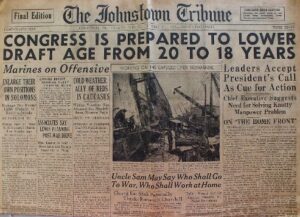 Before the summer of 1971, a person had to be 21 years old in order to vote. That was before the 26 Amendment was signed into law, on July 5, 1971, by President Richard Nixon. The amendment had passed through the Senate, House, and states in record time, lowered the voting age from 21 to 18, but it was not a quick victory. The battle was hard-fought, mostly by young people between the ages of 18 and 21, who were eligible to be drafted, but didn’t have the right to vote. The battle had raged since World War II.
Before the summer of 1971, a person had to be 21 years old in order to vote. That was before the 26 Amendment was signed into law, on July 5, 1971, by President Richard Nixon. The amendment had passed through the Senate, House, and states in record time, lowered the voting age from 21 to 18, but it was not a quick victory. The battle was hard-fought, mostly by young people between the ages of 18 and 21, who were eligible to be drafted, but didn’t have the right to vote. The battle had raged since World War II.
When the United States joined in the World War II war effort, it didn’t take long to find that they were going to need more men. It wasn’t that so many were killed, although that certainly was a problem too, but less than a year in, President Roosevelt and his administration faced a serious dilemma. They had 20 million eligible men who were registered for the draft, but 50% of them were rejected either for health reasons or because they were deemed illiterate. The United States had to have more men, and there was only one place to get them…expand the eligible draft ages. So, on November 11, 1942, Congress approved lowering the minimum draft age to 18 and raising the maximum to 37. Soon after, the slogan “Old enough to fight, old enough to vote” was born. For the over 21 draftees, the right to vote was already theirs, but the 18 to 20 year olds did not, and they felt like if they could be asked to fight and die, they should be able to vote…like ither adults, and much like the fight we have today with “old enough to fight, old enough to drink.” I’m not sure the current protestors will win their battle, however.
The changing of the voting age didn’t come easy either. Many people thought that 18-year-olds were just too young to understand politics. West Virginia congressman Jennings Randolph became the first supporter for lowering the age. In 1942, he introduced the first of 11 bills he sponsored over his tenure in Congress. Despite support from First Lady Eleanor Roosevelt and a number of senators and representatives, Congress failed to pass any legislation. Nevertheless, a popular movement was growing. Finally, in 1943, Georgia became the first 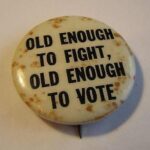 state to lower the voting age for state and local elections to 18, with Kentucky following suit in 1955. It broke the ice. While these young voters couldn’t vote for US offices, they had a say in their own state. The movement to lower the voting age began to gain grassroots traction when newly elected President Dwight D Eisenhower expressed his support in his 1954 State of the Union address, “For years our citizens between the ages of 18 and 20 have, in time of peril, been summoned to fight for America. They should participate in the political process that produces this fateful summons. I urge Congress to propose to the States a constitutional amendment permitting citizens to vote when they reach the age of 18.”
state to lower the voting age for state and local elections to 18, with Kentucky following suit in 1955. It broke the ice. While these young voters couldn’t vote for US offices, they had a say in their own state. The movement to lower the voting age began to gain grassroots traction when newly elected President Dwight D Eisenhower expressed his support in his 1954 State of the Union address, “For years our citizens between the ages of 18 and 20 have, in time of peril, been summoned to fight for America. They should participate in the political process that produces this fateful summons. I urge Congress to propose to the States a constitutional amendment permitting citizens to vote when they reach the age of 18.”
While it was gaining momentum, it was still slow-going. It would not be until much of the American public became disillusioned by the lengthy and costly war in Vietnam in the mid 1960s that the movement to lower the voting age gained widespread public support. “Old enough to fight, old enough to vote” found its way back into the American consciousness in the form of protest signs and chants. The push was revived, and then-Senator Randolph and other politicians continued to push legislation to lower the age to 18, including passing an amendment into 1965’s Voting Rights Act in 1970 that applied lowering the age to federal, state, and local elections. As the amendment was being signed into law, President Nixon thought it might be problematic. He issued a public statement that the federal government regulating state and local elections was likely to be “deemed unconstitutional and that only an amendment would secure this right.” He was right, and the amendment was struck down in the 1970 Supreme Court case Oregon v. Mitchell, ruling that the federal government could not make mandates for state and local elections. That meant that the fight continued. The initial result was a mixed system in which state and local elections had different rules than federal elections. That brought with it logistical problems on election days in states across the country, bringing more protests and lobbying efforts. The biggest problem was the 18 to 20 year olds worrying that their draft numbers were being called despite having no say in electing their representation. “Project 18” continued to put the pressure on legislators to take action. Marches were held all over the nation.
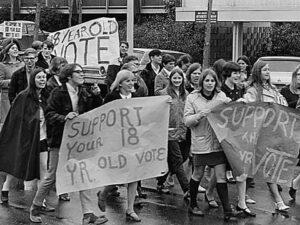
Finally, their hard work paid off. On March 10, 1971, the Senate voted unanimously in favor of a Constitutional amendment lowering the voting age to 18, followed by an overwhelming majority of the House voting in favor on March 23, 1971. The states quickly ratified the amendment, and it took effect on July 1, 1971, nearly 30 years after Senator Randolph first proposed lowering the voting age. In response to its passing, the senator remarked, “I believe that our young people possess a great social conscience, are perplexed by the injustices which exist in the world and are anxious to rectify these ills.” Finally, those who were “old enough to fight” could also vote.
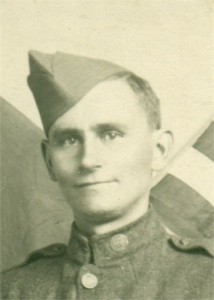 The United States is often called the Sleeping Giant. In the past, the United States has been known as the most powerful country in the world…back in the good old days, that is. Now China, Japan and Russia are also considered to be powerful countries where nuclear weaponry is concerned. The dollar was also the powerful currency, then and even now. The president of the United States was always considered the most powerful person, and I think still is today, or is moving back into that position. All these things considered, the United States was definitely a sleeping giant, because if it woke up it would do everything in its power to rectify things around the globe. As we saw on September 11, 2001, when terrorists attacked our country. Like Toby Keith sang in his song Courtesy Of The Red, White, And Blue (The Angry American), “Justice will be served, and the battle will rage. This big dog will fight when you rattle his cage. And you’ll be sorry that you messed with the U.S. of A” That is notoriously the way the United States has been when it comes to world conflict…slow to anger, but once we are in a war…we are in it to win it!
The United States is often called the Sleeping Giant. In the past, the United States has been known as the most powerful country in the world…back in the good old days, that is. Now China, Japan and Russia are also considered to be powerful countries where nuclear weaponry is concerned. The dollar was also the powerful currency, then and even now. The president of the United States was always considered the most powerful person, and I think still is today, or is moving back into that position. All these things considered, the United States was definitely a sleeping giant, because if it woke up it would do everything in its power to rectify things around the globe. As we saw on September 11, 2001, when terrorists attacked our country. Like Toby Keith sang in his song Courtesy Of The Red, White, And Blue (The Angry American), “Justice will be served, and the battle will rage. This big dog will fight when you rattle his cage. And you’ll be sorry that you messed with the U.S. of A” That is notoriously the way the United States has been when it comes to world conflict…slow to anger, but once we are in a war…we are in it to win it!
The same held true for the other wars we have been in. We might not jump in early, but when we do…look out. On this day, April 6, 1917, the United States Senate voted 82 to 6 to declare war against Germany, the United 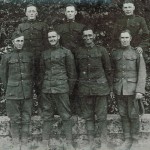 States House of Representatives endorses the declaration by a vote of 373 to 50, and America formally entered World War I. This action would be the one that would send my grandfather, George Byer to war. He was 24 years old. Grandpa didn’t talk much about his time in the war…at least not that I remember. I think that most of the men who came home after fighting in a war, are just happy to be home. They want to put it all behind them, and move forward with their lives, knowing that if it was ever necessary he would go back again. He was a patriot, and that was what patriots did. In fact, when the time came for the men to register for the “old man draft” of World War II…a time when men up to the age of 65 were required to register for the draft, Grandpa was honored to register, as were the other men between the ages of 45 and 65. These men felt like their time of usefulness was over, and when they were told that they were needed again, even if it was just for work on the home front, they all jumped at the chance to serve.
States House of Representatives endorses the declaration by a vote of 373 to 50, and America formally entered World War I. This action would be the one that would send my grandfather, George Byer to war. He was 24 years old. Grandpa didn’t talk much about his time in the war…at least not that I remember. I think that most of the men who came home after fighting in a war, are just happy to be home. They want to put it all behind them, and move forward with their lives, knowing that if it was ever necessary he would go back again. He was a patriot, and that was what patriots did. In fact, when the time came for the men to register for the “old man draft” of World War II…a time when men up to the age of 65 were required to register for the draft, Grandpa was honored to register, as were the other men between the ages of 45 and 65. These men felt like their time of usefulness was over, and when they were told that they were needed again, even if it was just for work on the home front, they all jumped at the chance to serve.
As for World War I, Grandpa would serve, and he would come home. Then, he would go on to live a long life…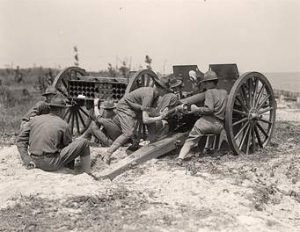 forever changed from the man he once was, because you see, war changes a man. They are changed by what they see, whether they were required to take a life or not. And if they were required to kill, then kill they would, because The Sleeping Giant had been awakened, and the Big Dog’s cage had been rattled. The United States would go to war, and they would win, along with their alleys, because losing was not an option…not if the world was to remain the kind of place we knew and loved. Germany was an evil empire, and that evil empire had to be stopped. I am very proud of my grandfather’s service, and I’m thankful that the Big Dog fought in this one and the other wars it has fought in. It was an important fight, and we needed to win it.
forever changed from the man he once was, because you see, war changes a man. They are changed by what they see, whether they were required to take a life or not. And if they were required to kill, then kill they would, because The Sleeping Giant had been awakened, and the Big Dog’s cage had been rattled. The United States would go to war, and they would win, along with their alleys, because losing was not an option…not if the world was to remain the kind of place we knew and loved. Germany was an evil empire, and that evil empire had to be stopped. I am very proud of my grandfather’s service, and I’m thankful that the Big Dog fought in this one and the other wars it has fought in. It was an important fight, and we needed to win it.
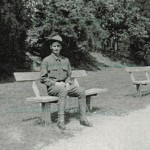 Since my oldest grandson, Chris Petersen turned eighteen last February 28th, and had to register for the draft, and my grandson, Caalab Royce will be registering in June after he turns eighteen this year on the 25th, I have wondered a little more about the making of a soldier…in any war. Since the draft is something that almost never happens these days, it was not a real priority in my mind, however. Then I started looking at my Aunt Bertha Hallgren’s journal again, because she was such a great writer, and because I haven’t referred to her work in a while. I stumbled across a reference she makes to the experience of a World War I soldier. Since my grandfather, George Byer fought in World War I, that part of her journal made me curious.
Since my oldest grandson, Chris Petersen turned eighteen last February 28th, and had to register for the draft, and my grandson, Caalab Royce will be registering in June after he turns eighteen this year on the 25th, I have wondered a little more about the making of a soldier…in any war. Since the draft is something that almost never happens these days, it was not a real priority in my mind, however. Then I started looking at my Aunt Bertha Hallgren’s journal again, because she was such a great writer, and because I haven’t referred to her work in a while. I stumbled across a reference she makes to the experience of a World War I soldier. Since my grandfather, George Byer fought in World War I, that part of her journal made me curious.
The story Aunt Bertha wrote was funny to a large degree, although I doubt that the soldier she wrote abut thought it was funny exactly. I suppose that as a eighteen year old boy, at a time when education was not always the top priority, he did not always understand the new to him words that were being thrown at him, being asked if you were an alien, might make you wonder if they were asking if you were sick right now, but the humor was somehow lost on the officer who was asking the questions. And when he asks you your name, and he has known you all your life, because he’s your milkman, it might be hard not to say, “You know my name.” Nevertheless, you must quickly learn that knowing you in life and knowing you in the military are obviously two very different things. You had better just answer the question and not act like a smart-aleck.
After getting past the registration area, and getting the feeling that these guys didn’t expect you to make it past the first week in combat, you might start looking for the door, and wondering if there was any way to make them believe you were only seventeen after all. Nevertheless, the line moved forward, and there was no way to get out of it, so you followed along. At some point you were issued a uniform, which the soldier Bertha was talking about described as one of two sizes…too small or too big. He pointed out that the pants were so tight that he didn’t dare sit down, and the shoes were so big that he could “turn around twice, and they didn’t move”. Sadly, I think that is the way it was during World War I. A guy could probably deal with the loose fitting clothes, but those tight ones wouldn’t last long. And to make matters worse for our particular soldier, he passed an officer, who immediately asked him if he had noticed the uniform the officer was wearing. In his typical eighteen year old mouthiness, and his lack of understanding the meaning of the question, our new soldier, asked why the officer was complaining. Hadn’t he seen how ill fitting the soldiers uniform was after all. I seriously doubt if the officer saw the humor in that.
After another mouthy session, the soldier found himself digging a hole…then being told to dig another one to throw the dirt into. I guess you can see where this task was heading. If our soldier didn’t figure out pretty fast 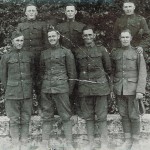 that he needed to keep his sarcasm to himself, then it is my guess that he spent a lot of time peeling potatoes, scrubbing floors, and digging holes…when he wasn’t fighting for his life that is. As time went on, I’m sure he figured out that they didn’t care about his opinion, and if he gave it anyway, he was going to wish he hadn’t. While this type of soldier would not really make a great soldier, he would probably have made a funny movie. I’m sure he got over the need to be funny once the bullets started flying too. By the way, I really don’t recommend that any of the soldiers, who might be coming up the ranks, act this way. I think that while sarcasm in school might make you the class clown, and make you popular with your friends, because that’s what kids do, it will not have the same affect on your commanding officer in any way, shape, or form.
that he needed to keep his sarcasm to himself, then it is my guess that he spent a lot of time peeling potatoes, scrubbing floors, and digging holes…when he wasn’t fighting for his life that is. As time went on, I’m sure he figured out that they didn’t care about his opinion, and if he gave it anyway, he was going to wish he hadn’t. While this type of soldier would not really make a great soldier, he would probably have made a funny movie. I’m sure he got over the need to be funny once the bullets started flying too. By the way, I really don’t recommend that any of the soldiers, who might be coming up the ranks, act this way. I think that while sarcasm in school might make you the class clown, and make you popular with your friends, because that’s what kids do, it will not have the same affect on your commanding officer in any way, shape, or form.
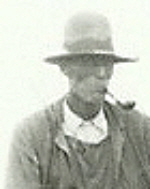 When I think about our organized military system, both during the years of the draft and now with our military being voluntary service, it occurs to me just how fortunate we, as a people, are to live where we do. There are so any evil leaders in countries who are not only enemies to the rest of the world, but in reality, enemies to their own people. In those countries, the military forces are not only not voluntary and not draft either, but rather they are forced into service, and often taken forcibly from their homes in the middle of the night, never to be seen again. Those taken are often children…even very young children, who are taken from their families and trained to be soldiers, or rather, trained killers. Their lives are viewed as unimportant. They are simply there to do the bidding of their evil government, and die doing it if necessary. They are expendable, because to replace them, the government simply goes out in the middle of the night and takes another child from another family by force. This was the position my great great grandfather, Stephan Beier found himself, his wife, Anna Maria Meier Beier, and their family in, one night in Russia. It was the reason that his family left Russia, and it was the reason my grandfather, Cornealius Byer was in the United States when he met my great great grandmother, Edna Fishburn in the Dakota Territory in the mid 1880’s.
When I think about our organized military system, both during the years of the draft and now with our military being voluntary service, it occurs to me just how fortunate we, as a people, are to live where we do. There are so any evil leaders in countries who are not only enemies to the rest of the world, but in reality, enemies to their own people. In those countries, the military forces are not only not voluntary and not draft either, but rather they are forced into service, and often taken forcibly from their homes in the middle of the night, never to be seen again. Those taken are often children…even very young children, who are taken from their families and trained to be soldiers, or rather, trained killers. Their lives are viewed as unimportant. They are simply there to do the bidding of their evil government, and die doing it if necessary. They are expendable, because to replace them, the government simply goes out in the middle of the night and takes another child from another family by force. This was the position my great great grandfather, Stephan Beier found himself, his wife, Anna Maria Meier Beier, and their family in, one night in Russia. It was the reason that his family left Russia, and it was the reason my grandfather, Cornealius Byer was in the United States when he met my great great grandmother, Edna Fishburn in the Dakota Territory in the mid 1880’s.
The family had been asleep and suddenly, they were awakened to the most horrifying event any family could ever imagine. Their son was taken at gun point, by soldiers. It was the Russian draft of the day. They did not care what his age was, nor did they care about any other qualifications, or the lack thereof. They needed more soldiers, and he had been chosen. I’m sure they had watched him for some time, along with watching many other young men his age. I don’t know how old he was at the time, but I do know that he was probably not out of school yet. What I do know is that my great great grandparents never saw their son again. My guess is that he probably lost his life in a battle somewhere within a year. The Russian leaders did not care about the soldiers…they were expendable…a dime a dozen, so their safety was unimportant. They were most likely sent into the worst battle zones, to fight the most likely to be lost battles. In that way, they government could keep their best officers and soldiers, the ones who had chosen to be there…if that was possible, safer from the worst battles. Or maybe, they put all the soldiers in the same harm’s way.
My great great grandparents were very distraught at the events of that night and they knew that they were not going to go through it again. The decision was made to secretly make their way out of Russia and go to the United States where their children could grow up safely, and if they were drafted into military service, they would be treated with dignity, and they would be able to stay in touch with their families. No parent is completely comfortable with their child going into military service, because if there is a war, their child will be in the middle of it. Nevertheless, they are proud of their child’s service…when it is done in the right way. To come into their home in the middle of the night, and forcibly take their child, knowing that they will never hear from that child again, is simply and horribly wrong. My great great grandparents decided that they were never going to go through it again. That is what made their decision to immigrate to the United States a move that was much less scary that the thought of staying in Russia. They never knew what happened to their son, and I’m certain that was something that stayed with them all their lives, but they knew they had done the right thing when they saw the rest of their family grow up and lead good lives in the United States.

